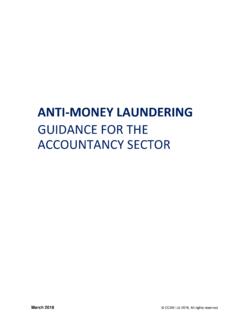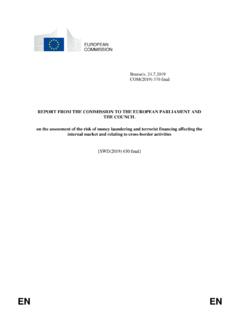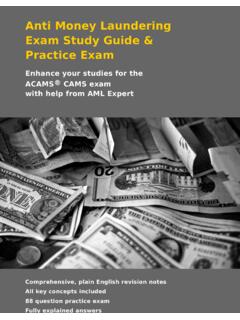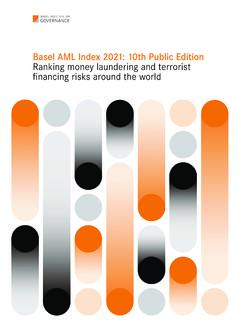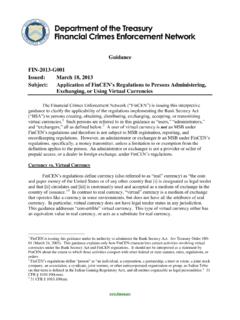Transcription of Ethics Pronouncement EP 200 - Institute of Singapore ...
1 Anti- money laundering and Countering the Financing of Terrorism Requirements and Guidelines for Professional Accountants in Singapore EP 200 was first issued by the Council of the Institute of Singapore Chartered Accountants (ISCA) on 29 October 2014. EP 200 was updated on 25 November 2015 and 10 August 2016. This EP is updated on 28 March 2017 and is effective 1 June 2017. All ISCA Members are required to comply with the requirements in this Pronouncement . Apparent failure to do so may result in an investigation into the member s conduct by the Investigation Committee of ISCA. Ethics Pronouncement EP 200 EP 200 ANTI- money laundering AND COUNTERING THE FINANCING OF TERRORISM REQUIREMENTS AND GUIDELINES FOR PROFESSIONAL ACCOUNTANTS IN Singapore (This Pronouncement is effective 1 June 2017.) CONTENTS Paragraph PREAMBLE 1-5 SECTION 1 ABOUT THIS Pronouncement Introduction Definitions Scope SECTION 2 REPORTING AND TIPPING-OFF Criminal Offences Reporting and Tipping-off Knowledge and Suspicion Procedures When Possible money laundering or Terrorist Financing is Discovered or Suspected Suspicious transactions reporting considerations for the professional accountant Confidentiality, statutory immunity and legal privilege SECTION 3 SYSTEMS AND CONTROLS Establishing Policies.
2 Procedures and Controls Risk-Based Approach Group Policy SECTION 4 CUSTOMER DUE DILIGENCE AND RECORDS KEEPING Customer Due Diligence What is Customer Due Diligence and Why it is Important When Customer Due Diligence Measures are to be Performed Application of customer due diligence measures Timing of customer due diligence measures Conducting Customer Due Diligence Know your client Ongoing monitoring Non-compliance with Customer Due Diligence Requirements The Risk-Based Approach to Customer Due Diligence Simplified customer due diligence measures Enhanced customer due diligence measures Screening Reliance on third parties Records Keeping EP 200 SECTION 5 REPORTING, TRAINING, COMPLIANCE, HIRING AND AUDIT Reporting Procedures Ongoing Training Compliance Management Hiring Independent Audit Function Appendix A: Description of money laundering and Terrorist Financing Appendix B: Summary of Basic Criminal Offences Under Anti- money laundering Legislation Appendix C: Summary of Basic Criminal Offences Under Terrorist Financing Legislation Appendix D: Summary of Basic Criminal Offences Under the Penal Code Appendix E: Indicators of Suspicious Transactions Appendix F: Suspicious Transaction Reporting Form Supplement A: For Auditors Supplement B: For Tax Practitioners EP 200 4 ANTI- money laundering AND COUNTERING THE FINANCING OF TERRORISM REQUIREMENTS AND GUIDELINES FOR PROFESSIONAL ACCOUNTANTS IN Singapore PREAMBLE 1.
3 Singapore has established a strict and rigorous anti- money laundering (AML) and countering the financing of terrorism (CFT) regime through its comprehensive and sound legal, institutional, policy and supervisory frameworks to ensure that Singapore is not a safe haven for money launderers and terrorist financiers. 2. The Financial Action Task Force (FATF) is an inter-governmental body established in 1989 to set standards and to promote effective implementation of legal, regulatory and operational measures for combating money laundering , terrorist financing and the financing of proliferation, and other related threats to the integrity of the international financial system. Singapore is committed to the fight against money laundering and terrorist financing and is a member of several international AML/CFT organisations, including FATF. As a member of FATF, Singapore is committed to comply with and implement the "International Standards on Combating money laundering and the Financing of Terrorism & Proliferation issued by the FATF (FATF Recommendations).
4 3. The AML and CFT legislations in Singapore provide a framework for discouraging money laundering and terrorist financing by, for example, establishing criminal sanctions for such activities and requiring the reporting of suspicious transactions to the authorities. 4. These legislations have implications on the responsibilities of professional accountants, including the risk of criminal liability on professional accountants for non-compliance. 5. The purpose of this Pronouncement is to provide information about our current AML and CFT legislations, and guidance on compliance with those legislations, as well as additional requirements and guidelines on AML and CFT to the professional accountants in Singapore . EP 200 5 SECTION 1 ABOUT THIS Pronouncement Introduction money is "laundered" to conceal criminal activity associated with it, including the crimes that generate the money , for example, drug trafficking, fraud and criminal breach of trust .
5 The term money laundering covers any activity by which the apparent source and ownership of money representing the proceeds of crime are changed so that the money appears to have been obtained legitimately. Terrorist financing refers to the direct or indirect act of providing or collecting property for terrorist acts, providing property and services for terrorist purposes, using or possessing property for terrorist purposes, and dealing with property of terrorists. A brief description of money laundering and terrorist financing is set out in Appendix A. This Pronouncement takes into consideration the following primary AML and CFT legislations in Singapore : (a) Primary legislation setting out criminal offences directly in relation to money laundering which apply to any person, regardless of the capacity in which he or she is acting. These offences are set out in the Corruption, Drug Trafficking and Other Serious Crimes (Confiscation of Benefits) Act, Cap.
6 65A (CDSA). The CDSA also imposes a duty on a person, who in the course of his or her professional duties comes to know or suspect that any property represents the proceeds of drug trafficking or criminal conduct, to report the knowledge or suspicion to the relevant authorities. A summary of the key provisions is set out in Appendix B; (b) Primary legislation setting out criminal offences directly in relation to terrorist financing which apply to any person, regardless of the capacity in which he or she is acting. These are set out in the Terrorism (Suppression of Financing) Act, Cap. 325 (TSFA). The TSFA also imposes a duty on a person who has possession, custody or control of terrorist property, or information regarding a transaction in terrorist property, to report such information to the relevant authorities. Furthermore, a person who has information which can prevent the commission of a terrorist financing offence, or assist in the apprehension, prosecution or conviction of a person for a terrorist financing offence, is required to immediately inform the relevant authorities.
7 A summary of the key provisions is set out in Appendix C; and (c) Primary legislation setting out criminal offences indirectly in relation to money laundering which apply to any person, regardless of the capacity in which he or she is acting. These offences are set out in Sections 107, 108, 108A and 108B of the Penal Code, Cap. 224. A summary of the key provisions is set out in Appendix D. Definitions For purposes of this Pronouncement , the following terms have the meanings attributed below: (a) Beneficial owner The natural person(s) who ultimately owns or controls a client, or the natural person on whose behalf a transaction is being conducted. Beneficial owner also includes any person who exercises ultimate effective control over a legal person or legal arrangement. (b) Branch An extension of the parent and is not a legal entity separate from the parent. (c) Connected party (i) In relation to a legal person (other than a partnership), means any director or any natural person having executive authority in the legal person; (ii) In relation to a legal person that is a partnership, means any partner, or manager (in the case of a limited liability partnership or a limited partnership); and EP 200 6 (iii) In relation to a legal arrangement, means any natural person having executive authority in the legal arrangement.
8 The term partnership includes foreign partnerships. The term manager takes reference from section 2(1) of the Limited Liability Partnership Act (Cap. 163A) and section 28 of the Limited Partnership Act (Cap. 163B). Examples of natural persons with executive authority in a company include the Chairman and Chief Executive Officer. An example of a natural person with executive authority in a partnership is the Managing Partner. (d) Group A parent, and its subsidiaries and branches. (e) Legal arrangement A trust or other similar arrangement. (f) Legal person An entity other than a natural person that can establish a permanent client relationship with a professional firm or otherwise own property. This can include companies, bodies corporate, foundations, partnerships, joint ventures or associations and other relevantly similar entities. (g) Network A larger structure that is aimed at co-operation, and that is clearly aimed at profit or cost sharing or shares common ownership, control or management, common quality control policies and procedures, common business strategy, the use of a common brand-name, or a significant part of professional resources.
9 (h) Network firm A firm or entity that belongs to a network. (i) Politically exposed person (PEP) A foreign PEP, domestic PEP or international organisation PEP. Foreign PEP means a natural person who is or has been entrusted with prominent public functions in a foreign country. Domestic PEP means a natural person who is or has been entrusted domestically with prominent public functions. International organisation PEP means a natural person who is or has been entrusted with prominent public functions in an international organisation. International organisation means an entity established by formal political agreements between member countries that have the status of international treaties, whose existence is recognised by law in member countries and which is not treated as a resident institutional unit of the country in which it is located. Examples include the United Nations and affiliated agencies such as the International Maritime Organisation and the International Monetary Fund; regional international organisations such as the Asian Development Bank, Association of Southeast Asian Nations Secretariat, institutions of the European Union, the Organisation for Security and Cooperation in Europe; military international organisations such as the North Atlantic Treaty Organisation; and economic organisations such as the World Trade Organisation or the Asia-Pacific Economic Cooperation Secretariat.
10 EP 200 7 Prominent public functions include the roles held by a head of state, a head of government, government ministers1, senior civil or public servants2, senior judicial or military officials, senior executives of state owned corporations, senior political party officials3, members of the legislature4 and senior management of international organisations5. The definition of PEPs is not intended to cover middle ranking or more junior individuals in the foregoing categories. (j) Family member of a PEP A parent, step-parent, child, step-child, adopted child, spouse, sibling, step-sibling and adopted sibling of the PEP. (k) Close associate of a PEP A natural person who is closely connected to a PEP, either socially or professionally. When determining whether a person is a close associate of a PEP, factors such as the level of influence the PEP has on such a person or the extent of his exposure to the PEP may be considered. (l) Professional accountant An individual who is a member of the Institute of Singapore Chartered Accountants (ISCA).





